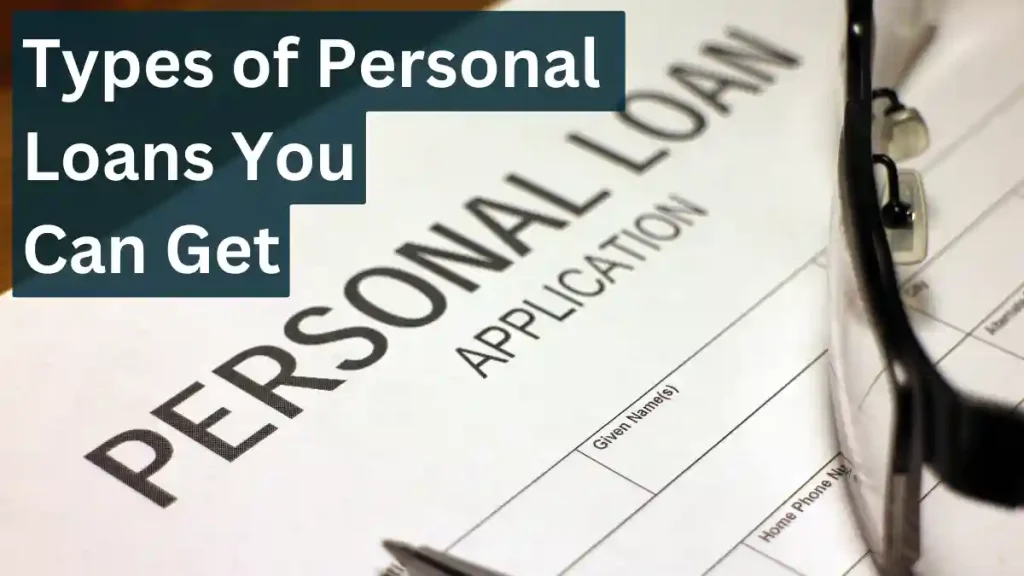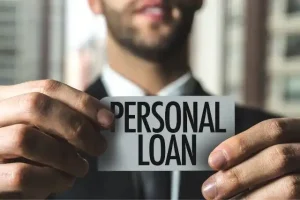Are you looking for a major purchase and in need of money ASAP? Do you need money to purchase a home, consolidate debt, or cover unexpected expenses?
If so, a personal loan may be a good option for you. But with so many different types of personal loans available, it can be tough to know which one is right for you.
In this blog article, we will explore the different types of personal loans available, including peer-to-peer loans, debt consolidation loans, fixed-rate loans, variable-rate loans, and co-signed and joint loans.

Introduction: What is a Personal Loan?
A Personal Loan is a loan that you can use for a variety of purposes, such as consolidating debt, financing a house, expenses for home improvements, paying for medical expenses, or paying for unexpected expenses.
These loans are generally offered by financial institutions like banks, credit unions, and online lenders, and are typically repaid over a period of time along with fixed monthly payments (interests).
Personal loans can be secured or unsecured.
Here are some of the most common types of personal loans
A. Secured Personal Loans
A secured personal loan requires you to put up an asset as collateral, such as a car, boat, or a home in order to secure the loan. If you as a borrower default on the loan, the lender can seize your collateral to recoup their losses.
Secured personal loans are generally easier to qualify for and have lower interest rates than unsecured personal loans as the lender is taking much fewer risks.
Some examples of secured personal loans include:
- Auto Loans: Auto loans are used to purchase a car (or vehicle). The car itself serves as collateral for the loan.
- Home Equity Loans: Home equity loans are used to borrow against the equity in your home. The equity in your home is the difference between the value of your home and the amount you owe on your mortgage.
- Secured Lines of Credit: Secured lines of credit are similar to credit cards but backed by collateral. If you (the borrower) default on the loan, the lender can seize your collateral.
Pros of Secured Personal Loans:
- Easier to qualify for
- Lower interest rates
Cons of Secured Personal Loans:
- You risk losing your collateral if you default on the loan

B. Unsecured Personal Loans
Unsecured Personal Loans do not require the borrower to put up any collateral. The lender bases their decision to lend to the borrowers based on their creditworthiness and income.
The interest rates may be higher than secured loans as the lender is taking more risk here.
Some examples of unsecured personal loans include:
- Signature loans: Signature loans are unsecured personal loans that are based on your creditworthiness.
- Credit card cash advances: Credit card cash advances allow you to borrow money against your available credit limit.
- Payday loans: Payday loans are small, short-term loans that are typically repaid on your next payday.
Pros of Unsecured Personal Loans:
- No collateral required
- Easier to get approved even if you have bad credit
Cons of Unsecured Personal Loans:
- Higher interest rates
- Shorter repayment terms
Other types of Personal Loans
In addition to secured and unsecured personal loans, there are a few other types of personal loans that you may want to consider:
1. Peer-to-peer (P2P) Loans
Peer-to-peer loans also known as P2P lending – are a way of borrowing and lending money between two people online, without involving traditional banks or financial institutions. They are facilitated through online platforms that connect borrowers with lenders/investors.
Say, it’s an alternative to traditional methods of credit and lending, as it enables individuals to obtain loans directly from another individual, cutting out the financial institution as the middleman.
The interest rates depend on the lenders putting their rates.
Note: Lenme App provides a Peer-to-Peer Loan. Read the full article on the Lenme App Review.
2. Fixed-rate Personal Loans
Fixed-rate personal loans have a fixed interest rate that stays the same for the entire life of the loan. This means that your monthly payments will be the same each month, regardless of what happens to interest rates in the market.
Fixed-rate loans can be a good option for borrowers who want predictability and stability in their monthly payments. They can also be a good option for borrowers who are concerned about rising interest rates.
However, fixed-rate loans generally have higher interest rates than variable-rate loans. This is because the lender is taking on the risk that interest rates will go down over the life of the loan, and they need to compensate themselves for that risk.
3. Variable-rate Personal Loans
Variable-rate personal loans have a variable interest rate that can change over time, based on changes in the market. This means that your monthly payments could go up or down depending on what happens to interest rates.
Variable-rate loans can be a good option for borrowers who are willing to take on some risk in exchange for the potential of lower interest rates. They can also be a good option for borrowers who plan to pay off their loan quickly, as they are more likely to benefit from lower interest rates in the early years of the loan.
However, variable-rate loans can be a riskier option for borrowers who are on a tight budget, as their monthly payments could go up if interest rates rise. They can also be a riskier option for borrowers who plan to keep their loan for a long time, as they are more likely to experience interest rate fluctuations over the life of the loan.
4. Debt Consolidation Loans
A debt consolidation loan is a personal loan that you can use to consolidate multiple high-interest debts into a single loan with a lower interest rate. This can help you save money on interest and make it easier to manage your debt payments.

Debt consolidation loans can be a good option for people who have multiple debts with high interest rates, such as credit card debt. By consolidating your debts into a single loan with a lower interest rate, you can save money on interest and make it easier to repay your debt.
However, it is important to note that debt consolidation loans do not eliminate your debt. They simply combine your debts into a single loan. If you do not make your payments on time, you could still default on the loan and damage your credit score.
» RELATED: How To Consolidate Debt With a Personal Loan
5. Co-signed and Joint Loans
A co-signed loan is a loan that you borrow with another person, who is known as the co-signer. The co-signer agrees to repay the loan if you default and you both are equally responsible for repaying the loan.
Co-signed and joint loans can be a good option for people who have bad credit or who need a higher loan amount than they could qualify for on their own.
Example: Joint loans can be a good option for couples who are buying a house or starting a business together.
Co-signed and joint loans have both pros and cons.
Pros of Co-signed and Joint loans:
- Can help you qualify for a loan or get a lower interest rate
- Can help you get a higher loan amount
- Can help you build your credit history
Cons of Co-signed and Joint loans:
- Co-signers are responsible for the loan if you default
- Joint borrowers are both responsible for the loan
- Co-signed and joint loans can affect your credit score if you default
Things to consider before getting a co-signed or joint loan
If you are considering getting a co-signed or joint loan, it is essential to carefully consider the following factors:
- Your relationship with the co-signer or joint borrower: Make sure that you trust the person you are getting the loan with and that you are comfortable being financially responsible with them.
- Your ability to repay the loan: Make sure that you can afford to repay the loan on time and in full.
- The impact on your credit score: Co-signed and joint loans can affect your credit score. If you default on the loan, your credit score could be damaged.
6. Credit Card Loans
Many credit card companies offer personal loans to their customers. Credit card loans allow you to borrow money from your credit card issuer, up to your available credit limit. You can use this money for various purposes like consolidating debt, paying your bills, or any other unexpected expenses.
Credit card loans are typically unsecured, meaning that you do not need to put up collateral to borrow the money. This makes them relatively easy to qualify for, even if you have bad credit. However, credit card loans also tend to have higher interest rates than other types of loans.
» READ MORE: Advantages of Using a Credit Card Wisely | 7 Key Tips
Pros of Credit Card Loans:
- Easy to apply for and qualify for, even if you have bad credit
- Can be used for any purpose
- No collateral required
- Flexible repayment options
Cons of Credit Card Loans:
- High-interest rates
- Short repayment terms
- Can be easy to overspend
- Can damage your credit score if you default on the loan
Which Type of Personal Loan is Right for Me?
The type of personal loan that is right for you will depend on your individual needs and circumstances. Consider the following factors when choosing a personal loan:
- The Purpose of the loan: Are you using the loan to consolidate debt, pay for medical expenses, or make home improvements? The purpose of the loan may help you decide which type of loan is right for you.
- The Amount of money you need to borrow: How much money do you need to borrow? Some lenders have minimum and maximum loan amounts.
- Your Credit score: Your credit score will affect your interest rate and whether or not you are approved for a loan.
- Your Debt-to-income ratio: Your debt-to-income ratio is the amount of debt you have compared to your income. Lenders typically look for a debt-to-income ratio of 36% or less.
It is important to compare offers from multiple lenders before choosing a personal loan. This will help you to find the best interest rate and terms for your needs.
Conclusion: Is it worth taking a Personal Loan?
Personal loans can be a great way to get the money you need to reach your financial goals. However, it is important to choose the right type of personal loan for your needs and to compare offers from multiple lenders before choosing a lender.
Read More Articles on:


